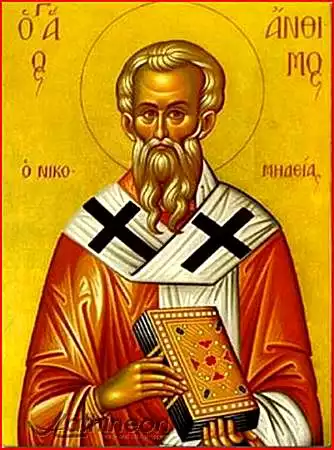
Saint Anthimus was a 4th century Christian bishop and martyr who served in the city of Nicomedia. He lived during the reign of the Roman emperor Diocletian and was persecuted for his Christian faith.
Steadfast Leadership Amidst Roman Persecution
In the early 4th century AD, Christianity was gaining traction across the Roman Empire, seen as a threat to traditional Roman religious beliefs. So when Emperor Diocletian took power in 284 AD, one of his key objectives was to quash the growth of this fledgling faith. This ushered in the era of the “Great Persecution” from 303-313 AD, one of the most intense campaigns against Christians in Roman history.
During this tumultuous time, men like Saint Anthimus, the Bishop of Nicomedia, provided steadfast leadership to terrorized Christian communities. Details surrounding Anthimus’ early life are scarce, though he is believed to have been born into a noble family in Nicomedia (located in modern-day Turkey). But historical evidence clearly frames Anthimus as an effective preacher from early on, successfully attracting converts through his teachings on Christ. His communication skills and leadership led to his appointment as Nicomedia’s bishop in the late 3rd century.
However, Anthimus’ devotion to his growing congregation was soon tested. Once the Great Persecution broke out, Roman officials were tasked with ruthlessly punishing any citizen who rejected the empire’s long-held polytheistic beliefs. Churches were destroyed, sacred texts were burned, and refusing to praising the Roman gods often meant imprisonment or death. Followers were forced to choose between renouncing their newfound faith or rebellion.
Even in the face of such a gut-wrenching decision, Anthimus remained authentically anchored in Christian doctrine. The bishop provided counsel to terrified citizens: “Do not fear those who kill the body but cannot kill the soul.” He reminded them that death was not something to dread, but rather a passage into eternal life beside God. Anthimus’ message resonated powerfully; he was seen as a fiduciary of Christ’s promise during a time of horrific oppression.
Unsurprisingly, Anthimus’ steadfast preaching and conversions attracted swift retaliation from Nicomedia’s Roman ruler Maximian. Seeing this local religious leader as the root of the spreading “heresy”, Maximian first tortured several of Anthimus’ followers, hoping to lure the bishop into surrendering himself. Yet still Anthimus persisted, continuing to directly challenge the Roman gods as “lifeless idols” while urging Christians towards baptism.
By 304 AD, Roman ruler Maximian had lost patience with Anthimus’ ongoing Christian preaching and conversions. He brought Anthimus in for intensive questioning, hoping to coerce him into surrendering his faith. Yet the bishop withstood threats of punishment, remaining unfazed. Despite maximian’s insistence, Anthimus held to his beliefs, continuing to advocate for monotheism in the face of polytheistic Roman traditions. When Maximian ultimately called for his execution, Anthimus prayed in gratitude, embracing the honor of joining past martyrs in conviction and sacrifice. He was then put to death before onlooking crowds in Nicomedia’s center.
In the coming decades, Anthimus’ courageous sacrifice made him a revered martyr across emerging Christian communities. He became a symbol of the last vestiges of Christ’s early disciples – those willing to surrender fully to the promise of death leading to eternal salvation. Today, Saint Anthimus continues to be honored in September by many Eastern Orthodox traditions – not only for his steadiness in the face of terrorization, but equally for using compassion as a catalyst towards mass conversion.
Saint Anthimus’ martyrdom marked a vital moment for the early Christian church – revealing both the intense external persecution it faced under Roman rule as well as the unwavering conviction within its leadership. The bishop’s courage to continue preaching in plain sight, converting hundreds of new followers despite imperial threats, embodied a key evolution: the transition of Christianity from a fringe sect to an emboldened, manifest faith across the Roman Empire. By the late 4th century AD, Anthimus’ example of principled, eloquent leadership in the face of violence would inspire waves of subsequent theological thinkers and martyrs.
Feast Day: September 3
